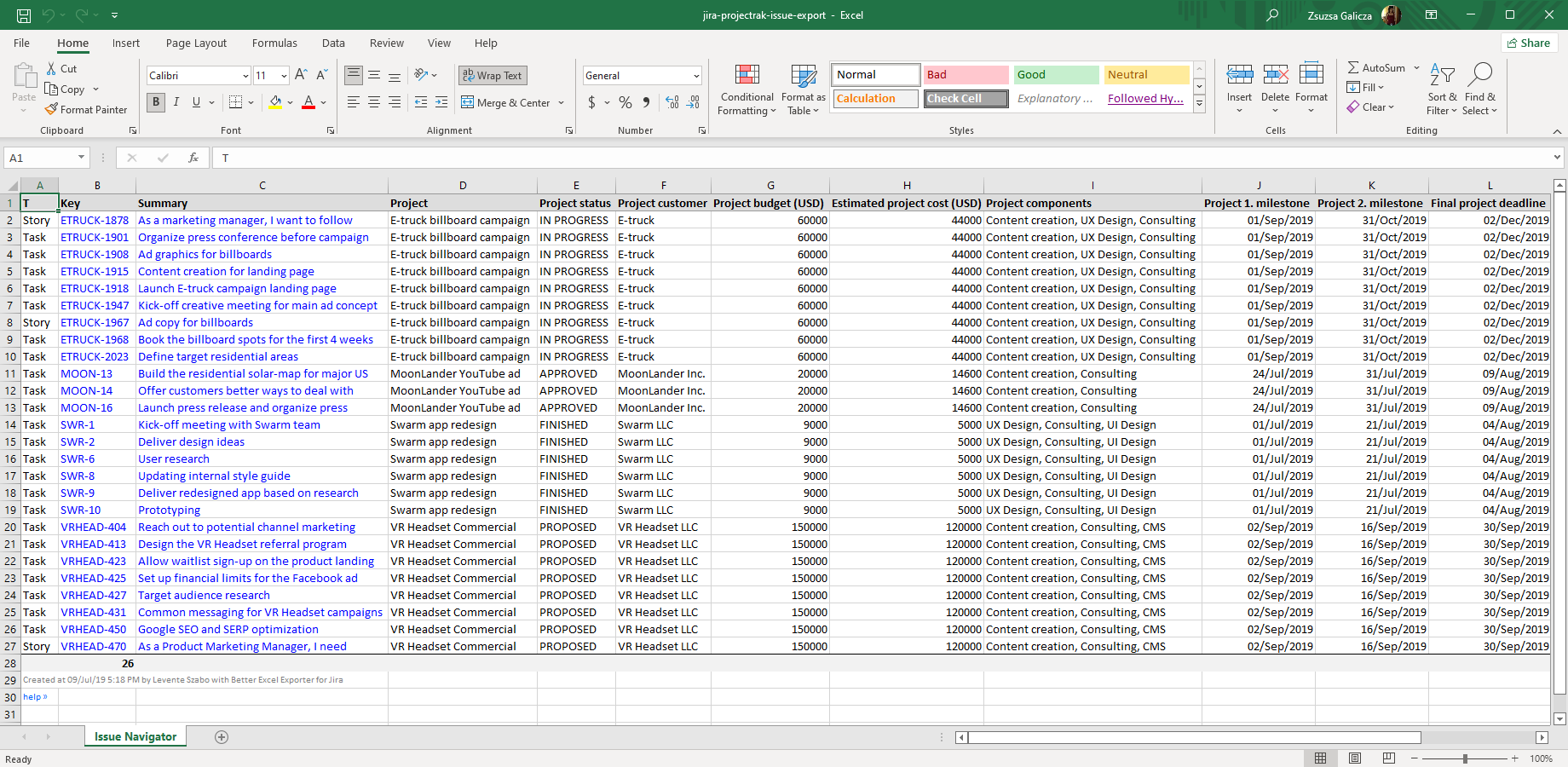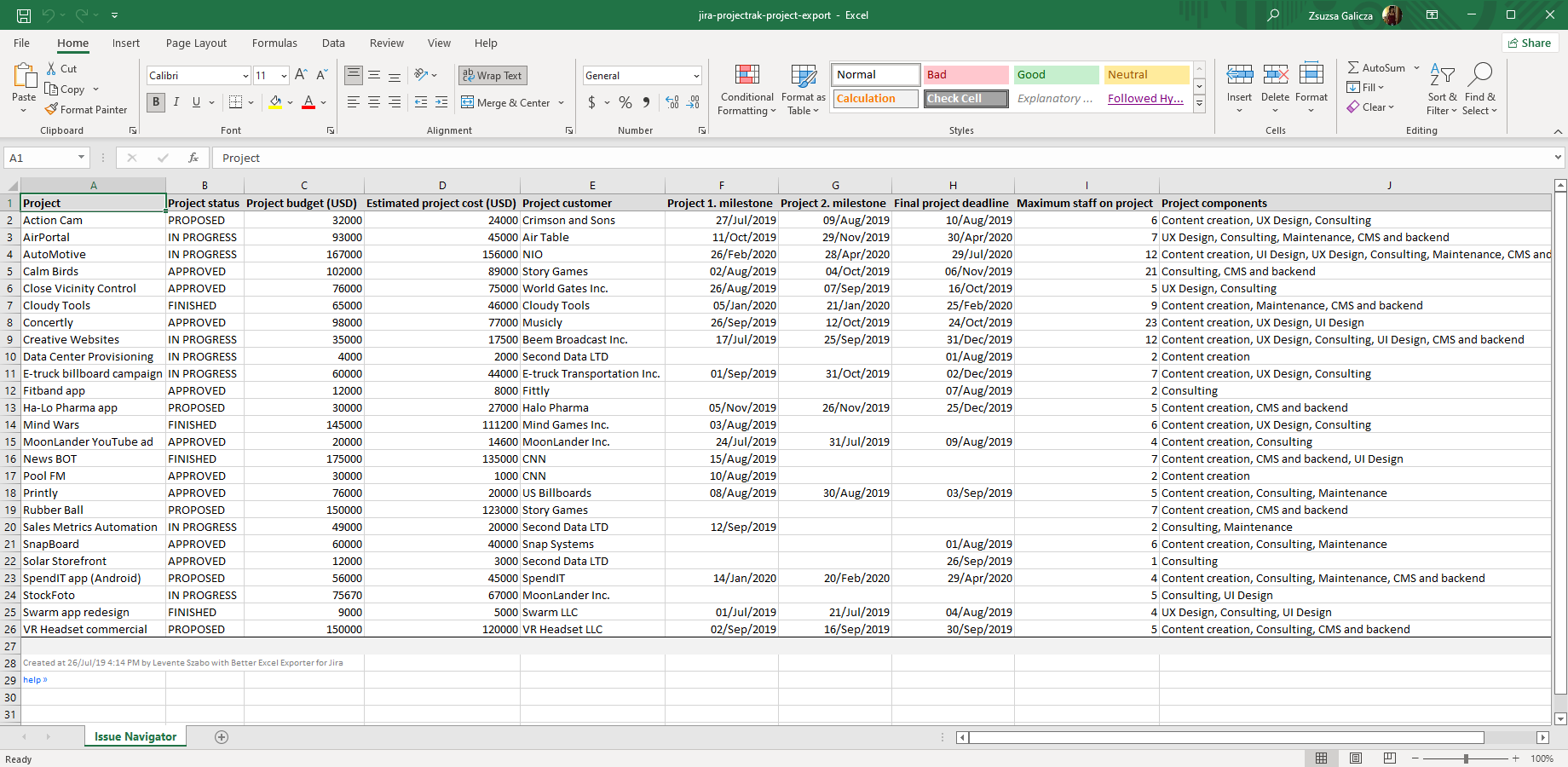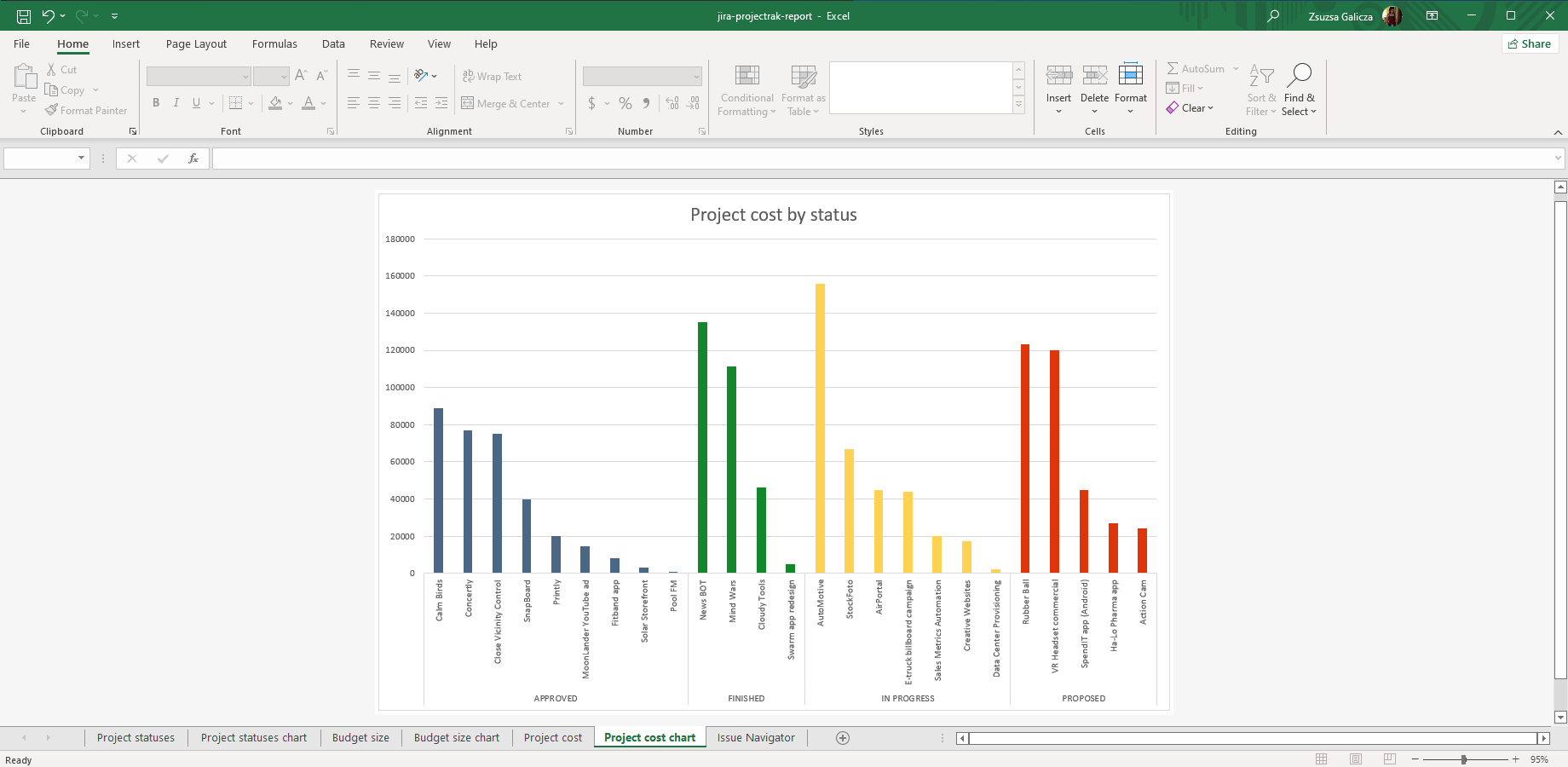In this page
Projectrak integration features
Projectrak integration vs. the Projectrak built-in Excel exports
Tutorial video
Projectrak Excel export samples
Issues with Projectrak custom fields
Projects with Projectrak custom fields
Projectrak project report
Configuration
Configuring the Projectrak custom fields for issues
Configuring the Projectrak custom fields for projects
Learn more about Projectrak
What is Projectrak?
(supported since Better Excel Exporter 4.3.0)
Projectrak is the project administration app for Jira that enables adding custom fields to projects, such as due dates, budgets and supervisors.
Projectrak integration features
- You can export the Projectrak-managed issue custom field types to which the Projectrak-managed project custom fields are mapped to. The supported project custom field types include Date, Duration, Group, List, Number, Priority, Project, Status, Text and User to Excel. (Cumulative and Script are not supported, as those cannot be mapped to issue custom fields.)
(Need more features? Tell us in a support ticket!)
Projectrak integration vs. the Projectrak built-in Excel exports
You may want to ask: if Projectrak has a built-in Excel export feature, why would you use another app for the same?
While the Projectrak built-in Excel exports may be sufficient for basic use cases, the Better Excel Exporter integration is more powerful in, at least, these:
-
It supports Excel automation.
You can export, email and attach Excel files using Automation for Jira (visual automation rules), ScriptRunner (Groovy scripts), or the REST API (use your favorite language!). -
It is extremely customizable.
Instead of accepting the pre-defined export types in Projectrak, you can define your own types via Excel templates. -
It supports all the powerful Excel features.
You can use Excel formulas and functions, custom calculations in Groovy (sorting, complex math, data integration, etc.), charts, pivot tables, pivot charts, Visual Basic macros, among others. -
It is integrated with all the popular Jira apps.
You can freely combine Projectrak data and other apps' data in the same Excel file. -
It comes with powerful templates optimized for Projectrak.
You can use those "as is", or customize them to your needs. - It is well-documented with the customization guide, the Expression Reference Manual, the recipes, and such.
If at least one of these is important for you, give the app a try.
Tutorial video
After mapping the project custom fields to issue custom fields (using the standard Projectrak feature), the Better Excel Exporter app transparently exports those to Excel:
Projectrak Excel export samples
Issues with Projectrak custom fields
This export contains Jira issues from multiple projects, with the Projectrak-managed data of their encompassing projects (column E-L). Note that the Projectrak values are exported to Excel with the precise data types (numbers, dates, etc.).
Projects with Projectrak custom fields
Not only issues, but also projects can be exported to Excel (using this technique). If you have a large number of Jira projects, it offers an easy way to search, share and transfer project information between stakeholders or IT systems.
Projectrak project report
You can also create powerful cross-project, program- and portfolio reports from Projectrak data to complement your Jira reporting. This example contains Excel pivot charts to visualize the project status distribution among projects, the project costs, and the relationship between those (cost by status).
Configuration
Configuring the Projectrak custom fields for issues
Please note that the Projectrak-managed custom fields are primarily attached to projects (not to issues). To make them available also for issues, map the project fields to Jira issue custom fields by using the Map into a Jira issue custom field option (in the Special options dropdown at Projectrak field settings).
After this, Better Excel Exporter will automatically recognize the issue custom fields to which the project custom fields are mapped to, and export them accordingly.
Configuring the Projectrak custom fields for projects
In another Projectrak-related use case, you want to export the projects (not issues) and their custom fields to Excel. Although the default export types offered by Better Excel Exporter primarily focus on issues, exporting project is also possible with an easy workaround.
Steps:
- Open Issue Navigator.
- Select exactly one issue from each project you want to export. (See the next section for techniques.)
- Show the Project column.
- Show the columns with those Projectrak-managed fields that you want to export.
- Hide all issue-specific columns (like Summary and such).
- At this point, there is one project in each line and there are only project-dependent columns shown. Export using the "Better Excel (Current fields)" option in the Export drop-down menu.
- Voila, you have just exported your projects to Excel!
All right, but how to select the issues as in step 2 above?
-
If you want to export only a couple of projects, you can write a JQL by enumerating the first issue keys in those:
key IN (FOO-1, BAR-1, BAZ-1) ORDER BY project
This is simple, but it is painful for a larger number of projects. -
If you want to make it more automatic, introduce a new issue type that represents projects, and give it some intuitive name, e.g. "Project Object".
Then, create exactly one instance of this issue type in each project.
Having that, a JQL query like this will return that single issue from each project:
type = "Project Object" ORDER BY project
Note that it will work for any number of projects until there is one "Project Object" type issue created in those. - If you need more flexibility, write a short Groovy script that receives the issue collection as input, iterates over it, only leaves one issue per project and removes the rest, and returns the resulted collection to the template.
Learn more about Projectrak
- Projectrak product information (at its own vendor)
- Projectrak documentation
- Projectrak app page (on the Atlassian Marketplace)




